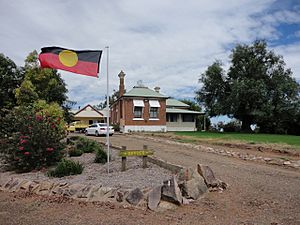Cootamundra Domestic Training Home for Aboriginal Girls facts for kids
Quick facts for kids Cootamundra Aboriginal Girls' Training Home |
|
|---|---|

Driveway leading to western wing
|
|
| Location | 39 Rinkin Street, Cootamundra, Cootamundra-Gundagai Regional Council, New South Wales, Australia |
| Built | 1912–1974 |
| Architect | Morell and Kemp |
| Owner | Young Local Aboriginal Land Council |
| Official name: Cootamundra Aboriginal Girls' Training Home; Cootamundra Girls' Home; Aboriginal Girls' Training Home; Bimbadeen Bible College; | |
| Type | state heritage (built) |
| Designated | 17 February 2012 |
| Reference no. | 1873 |
| Type | Place of significance |
| Category | Aboriginal |
| Lua error in Module:Location_map at line 420: attempt to index field 'wikibase' (a nil value). | |
The Cootamundra Domestic Training Home for Aboriginal Girls was a special place in Cootamundra, New South Wales. It was also known as "Bimbadeen" or the Cootamundra Girls' Home. This home was run by the New South Wales government from 1911 to 1968. Its main purpose was to train young Aboriginal girls.
These girls were part of what is now known as the Stolen Generations. This means they were taken from their families by the government. A law called the Aborigines Protection Act 1909 allowed this to happen. The girls were not allowed to see or talk to their families. Instead, they were trained to work as domestic servants. This meant they learned skills like cleaning, cooking, and looking after homes.
The building that housed the Home later found a new purpose. A Christian group called the Aboriginal Evangelical Fellowship took it over. They turned it into a training centre called Bimbadeen College. Here, people could learn job skills, cultural knowledge, and farming. The site was added to the New South Wales State Heritage Register on 17 February 2012. This means it is recognized as an important historical place.
Contents
What Was the Cootamundra Girls' Home?
The Cootamundra Domestic Training Home was a place where young Aboriginal girls lived and learned. It was set up by the government in New South Wales. The home operated for many years, from 1911 until 1968. It aimed to prepare girls for work in other people's homes.
Why Were Girls Sent There?
Girls were sent to the Cootamundra Home because of a government policy. This policy allowed officials to remove Aboriginal children from their families. The children taken were part of the Stolen Generations. This was a very sad time for many Aboriginal families. Girls were often taken at a young age. They were then brought to places like Cootamundra.
The Protection Act
The removals happened under a law called the Aborigines Protection Act 1909. This law gave the government a lot of power. It allowed them to control the lives of Aboriginal people. For the girls, it meant being separated from their parents and communities. They lost contact with their culture and language.
Life at the Home
Life at the Cootamundra Home was very structured. The girls followed a strict routine every day. They were taught skills that were useful for domestic work. This included cooking, cleaning, and laundry. The goal was to prepare them for jobs as servants.
Daily Routines
The girls woke up early and had chores to do. They spent their days learning and working. There was little time for play or personal freedom. They were expected to follow all the rules. This strict environment was meant to make them disciplined workers.
Learning Skills
The main focus was on practical skills. Girls learned how to manage a household. They were taught to be efficient and hardworking. These skills were important for their future jobs. However, they often missed out on a normal childhood. They also missed learning about their own Aboriginal heritage.
After the Home Closed
The Cootamundra Girls' Home closed its doors in 1968. This was a time when government policies began to change. The idea of forcibly removing children started to be questioned. The closure marked the end of an era.
A New Purpose
After the home closed, the building was used for something new. The Aboriginal Evangelical Fellowship took it over. They renamed it Bimbadeen College. This college offered different types of training. It focused on Christian teachings, cultural studies, and farming. It aimed to help Aboriginal people in a positive way.
Remembering the Past
Today, the site is recognized as a heritage place. It is on the New South Wales State Heritage Register. This helps to remember its history. It reminds us of the Stolen Generations and their experiences. It is a place for reflection and learning.
Images for kids
 | Stephanie Wilson |
 | Charles Bolden |
 | Ronald McNair |
 | Frederick D. Gregory |





